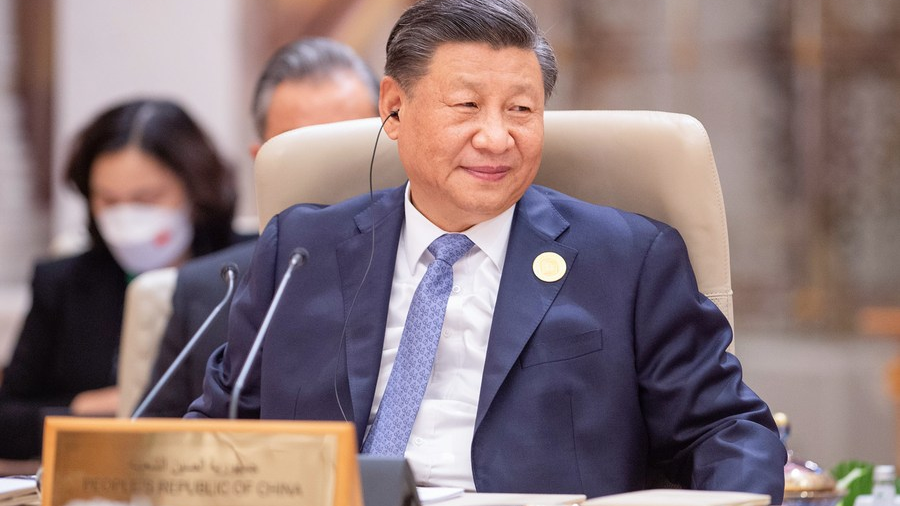LATEST INSIGHTS
Your Present Location: LATEST INSIGHTSWilliam Jones: Milestone visit shifts China-Arab relations to a strategic partnership
Source: CGTN Published: 2022-12-11
Editor's note: William Jones is the former White House correspondent for Executive Intelligence Review and a non-resident Fellow of the Chongyang Institute for Financial Studies, Renmin University of China. The article reflects the author's opinions, and not necessarily those of CGTN.
Already on his visit to the Middle East in 2016, Chinese President Xi Jinping had set the stage for a new relationship between China and the Arab countries. Numerous agreements have since been signed with Arab countries joining the Belt and Road Initiative (BRI). The diligent work of Chinese diplomacy has culminated in a relationship this year, with the "milestone" visit of President Xi to Saudi Arabia, which will take the China-Arab relationship to a new level, from economy and trade to increasing cooperation in the area of culture, politics and security.
As President Xi indicated in an article he wrote prior to his visit and published in the Saudi newspaper, Al Ryadh, the relationship with the Arab countries hearkens back to the ancient Silk Road, which provides an avenue of South-South cooperation. China's consideration of the important cultural links between the two nations goes back to ancient times was also underlined in the article, noting that China provided porcelain, paper-making and printing techniques to the Arab world, and brought from the Arab world to China their advanced understanding in astronomy, medicine, and the calendar.
The cultural and social aspects were also on view during President Xi's visit. Prior to his visit, President Xi had also written a letter of encouragement to the Saudis who were studying the Chinese language. Xi was given an honorary doctorate at the King Saud University, the first university in the Arab world that has instituted a Chinese studies program – but certainly not the last.
There were many deals inked with the Saudis during the course of the trip, as Saudi Arabia has already become involved in the BRI with China having invested in key infrastructure, and is intent on investing in more. One of the main projects has been a high-speed rail link between Medina and Mecca, which will facilitate the millions of Muslims traveling to Mecca each year for the annual hajj. In many respects, this was a gift to the Muslim world as a whole, noting the importance of the hajj for all Muslims, all of whom are encouraged to make the trip at least once in their lifetimes.

Chinese President Xi Jinping attends the China-Gulf Cooperation Council Summit and delivers a keynote speech, in Riyadh, Saudi Arabia, December 9, 2022. /Xinhua
There were, of course, major contracts signed with regard to the supply of oil and gas, which has become very important for the growing Chinese economy. But on the trip, there was also the opportunity to talk with dozens of leaders of the Arab world. Xi attended two major summits with Arab leaders while in Saudi Arabia, the China-Gulf Cooperation Council (GCC) Summit and China-Arab States Summit. At the China-Arab States Summit, Xi renewed China's commitment to a land-for-peace solution to the Israel-Palestinian conflict, taking a firm step to support a just resolution for the Palestinian people. During the three days in Riyadh, Xi also sat down with the leaders of Egypt, Kuwait, Sudan, Somalia, Palestine, Qatar, Iraq, Mauritania, Tunisia, Algeria, Lebanon and others, strengthening the links with those important countries on the western end of the ancient Silk Road.
With the Saudis, in particular, the visit marked a step forward in their relationship. While much of the country-to-country interaction has been in the field of trade and investment, it has now broadened into a comprehensive strategic partnership. Saudi Arabia, a traditional ally of the United States is interested in joining the Shanghai Cooperation Organization. In particular, the attempt by the United States to disrupt the global oil markets with their sanctions against Russia and their attempt to limit the price of Russian oil sold, has met with stern opposition from Saudi Arabia and the OPEC countries, which have indicated that they are not going to cooperate.
In his speech to the China-Arab States Summit, President Xi underlined the significance of peace and security in the Middle East and promised that China would play a greater role in securing the conditions. There will also be cooperation between defense officials from China and Saudi Arabia to help provide a greater sense of cooperation in the security arena. One observer noted that the Arab countries have many relations with other countries and regions, with the United States and with Europe, but indicated that this relationship would be more significant and considerably closer as China and the Arab countries are both interested in maintaining a multipolar, rather than the unipolar world being brandished so brazenly by the United States.























































































 京公网安备 11010802037854号
京公网安备 11010802037854号





